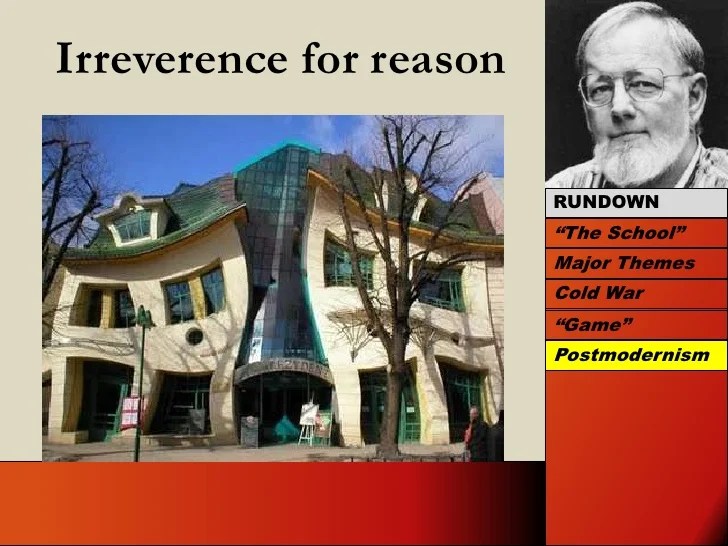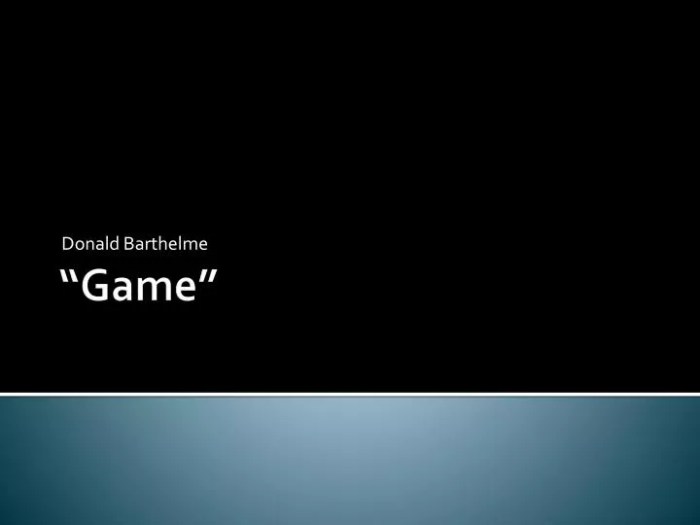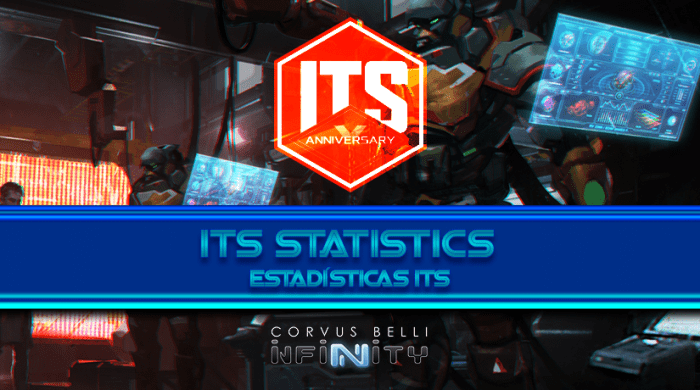The game by donald barthelme – Unveiling the enigmatic world of Donald Barthelme’s “The Game,” this exploration delves into the depths of a novel that defies conventional narrative and meaning-making, leaving readers captivated by its fragmented and absurd brilliance.
Barthelme’s experimental prose style weaves a labyrinth of characters and relationships, inviting us to question the nature of reality and the search for meaning in a world that often seems devoid of it.
Introduction

Donald Barthelme’s “The Game” is an experimental novel published in 1968. It is a fragmented and surreal narrative that explores themes of reality, identity, and communication.
The novel was met with critical acclaim upon its release, and it has since become a classic of postmodern literature. It has been praised for its innovative use of language and its insightful exploration of the human condition.
The Game by Donald Barthelme, a collection of short stories, is full of wit and wordplay. Many words in the book start with the letters “hosp,” like “hospitality” and “hostage.” If you’re interested in exploring more words that start with “hosp,” you can check out this list: words that start with hosp . Returning to Barthelme’s work, the stories in The Game are often about the absurdities of modern life, and they’re sure to make you think.
Significance of “The Game”
- It challenged conventional notions of narrative and reality.
- It introduced new ways of thinking about language and communication.
- It influenced a generation of writers and artists.
Literary Style and Techniques

Donald Barthelme’s “The Game” is characterized by its unique and experimental writing style. Barthelme employs various literary techniques to create a fragmented, absurd, and metafictional narrative that challenges traditional literary conventions.
Fragmentation
Fragmentation is a key element of Barthelme’s writing style in “The Game.” The novel is composed of a series of short, disjointed fragments that jump between different characters, settings, and time periods. This fragmentation creates a sense of discontinuity and disorientation, forcing the reader to piece together the narrative from scattered fragments.
Absurdity
Barthelme also employs absurdity as a literary technique in “The Game.” The novel is filled with bizarre and illogical situations, characters, and events that defy rational explanation. This absurdity creates a sense of alienation and discomfort, challenging the reader’s expectations of a coherent and meaningful narrative.
Metafiction
Metafiction is another important aspect of Barthelme’s writing style in “The Game.” The novel frequently breaks the fourth wall, acknowledging its own fictional nature and calling attention to the process of writing and reading. This metafictional element creates a self-reflexive narrative that blurs the lines between fiction and reality.
The use of fragmentation, absurdity, and metafiction in “The Game” creates a unique and challenging reading experience. These techniques disrupt traditional narrative conventions, forcing the reader to actively engage with the text and question their own assumptions about literature.
Characterization and Relationships
In “The Game,” Donald Barthelme presents a cast of characters whose motivations and relationships are complex and often ambiguous. Isolation and alienation play significant roles in shaping their interactions, creating a sense of distance and emotional disconnect.
Main Characters
The story revolves around three primary characters: the Narrator, his wife, and their friend Robert.
- The Narrator:An unnamed and unreliable narrator who is both a participant and observer in the game. He is aloof and detached, often retreating into a world of his own thoughts and observations.
- The Narrator’s Wife:A mysterious and elusive figure who remains largely unknown to the reader. Her motivations and desires are shrouded in secrecy, and she serves as a constant source of fascination and frustration for her husband.
- Robert:A close friend of the Narrator who becomes entangled in the strange and unsettling game. He is a curious and adventurous soul, but his involvement in the game ultimately leads to his downfall.
Ambiguous Relationships
The relationships between the characters in “The Game” are complex and often difficult to define. The Narrator’s marriage is strained and distant, characterized by a lack of communication and emotional intimacy.
Robert’s friendship with the Narrator is equally enigmatic. While they share a bond of trust and companionship, there is also a sense of competition and rivalry between them. As the game progresses, their friendship becomes increasingly strained, and Robert’s obsession with winning ultimately leads to his demise.
Isolation and Alienation
Isolation and alienation are pervasive themes throughout “The Game.” The Narrator is a loner who struggles to connect with others. His wife is equally isolated, living in her own private world. Robert’s desire to escape his mundane existence leads him into the dangerous and isolating world of the game.
The game itself becomes a symbol of the characters’ alienation. It is a closed system that excludes outsiders and creates a sense of separation and isolation among those who participate. The rules of the game are arbitrary and nonsensical, and the players are left to navigate its complexities without any clear purpose or direction.
Themes and Symbolism
“The Game” explores profound themes through a unique blend of absurdity and philosophical inquiry.
Nature of Reality
The novel questions the nature of reality, presenting it as a fluid and subjective construct. The characters’ experiences and perceptions are often unreliable, blurring the lines between reality and illusion.
Through the character of Hilary, the novel suggests that reality is a game, governed by arbitrary rules that are constantly shifting. This notion challenges traditional understandings of objective truth and highlights the elusive nature of reality.
Absurdity of Existence
The novel embraces the absurdity of existence, portraying a world where logic and reason often fail. The characters’ actions and interactions are often irrational and nonsensical, reflecting the inherent meaninglessness of life.
The use of repetitive dialogue and mundane events emphasizes the cyclical and meaningless nature of human existence. The characters’ futile attempts to find purpose and order in a chaotic world highlight the absurdity of their search.
Search for Meaning
Despite the absurdity of existence, the novel also explores the human need for meaning. The characters’ relentless pursuit of understanding and connection, even in the face of futility, reflects their innate desire to make sense of their world.
The novel suggests that meaning is not something to be found but rather something to be created. Through their interactions and experiences, the characters ultimately find a sense of purpose in the shared human experience.
Symbolism
“The Game” employs a rich array of symbols and imagery to convey its themes. The game itself symbolizes the elusive and ever-changing nature of reality. The characters’ names, such as Hilary (meaning “cheerful”) and Rose (a symbol of hope), ironically contrast with their often bleak experiences.
The recurring image of the labyrinth represents the characters’ search for meaning in a confusing and disorienting world. The endless corridors and dead ends reflect the futility of their quest for certainty and order.
Challenge to Traditional Narrative
“The Game” defies traditional notions of narrative and meaning-making. Its fragmented structure and lack of a clear plot challenge the reader’s expectations. The novel invites readers to participate in the game, to question their own assumptions about reality, and to embrace the absurdity and beauty of existence.
Cultural and Historical Context

Donald Barthelme’s “The Game” is a product of its time, reflecting the cultural and historical landscape of the 1960s. It is heavily influenced by the postmodern and avant-garde movements, which challenged traditional literary conventions and embraced experimentation.
Postmodernism and the Avant-garde
Postmodernism emerged in the mid-20th century as a reaction to the perceived rigidity and rationality of modernism. Postmodern writers rejected the idea of a single, objective truth and embraced fragmentation, subjectivity, and playfulness. Avant-garde art, which emerged earlier in the 20th century, similarly sought to break down boundaries and challenge established norms.
“The Game” embodies these postmodern and avant-garde principles. It is a fragmented and nonlinear narrative that defies traditional plot and characterization. It is filled with absurdities, paradoxes, and metafictional elements that challenge the reader’s expectations and subvert literary conventions.
Social and Cultural Landscape of the 1960s
The 1960s was a period of great social and cultural upheaval. The Vietnam War, the Civil Rights Movement, and the rise of counterculture challenged traditional values and institutions. This atmosphere of change and uncertainty is reflected in “The Game,” which explores themes of alienation, identity, and the search for meaning in a chaotic world.
The novel’s use of fragmentation and nonlinearity mirrors the fragmented and disorienting nature of the 1960s. Its characters are often lost and adrift, struggling to find their place in a society that seems to be unraveling.
Contemporary Resonance
The themes and techniques of “The Game” continue to resonate with contemporary society. The novel’s exploration of alienation, identity, and the search for meaning is relevant to individuals living in a rapidly changing and often chaotic world.
Moreover, the novel’s postmodern and avant-garde elements have influenced contemporary literature and art. Its fragmented and nonlinear narrative has become a common feature in postmodern fiction, while its playful and experimental style has inspired artists and writers alike.
Critical Reception and Legacy: The Game By Donald Barthelme

Upon its publication in 1968, “The Game” received mixed critical reception. Some critics praised Barthelme’s experimental style and innovative approach to narrative, while others found the novel’s structure and lack of conventional plot confusing and frustrating.
In the years since its initial release, “The Game” has become increasingly recognized as a seminal work in postmodern literature. Critics have praised the novel’s playful and subversive exploration of language, reality, and identity, and its influence on subsequent generations of writers is undeniable.
Impact on Literary Theory and Practice
Barthelme’s unique approach to storytelling in “The Game” challenged traditional notions of narrative structure and character development. His use of fragmentation, repetition, and ambiguity opened up new possibilities for experimental writing and influenced the development of postmodern literary theory.
- Fragmentation:Barthelme’s use of short, disconnected fragments disrupts the traditional linear narrative, creating a sense of discontinuity and fragmentation that reflects the fragmented nature of modern experience.
- Repetition:The novel’s repetitive elements, such as the recurring phrase “the game,” create a sense of circularity and reinforce the novel’s exploration of the cyclical nature of human experience.
- Ambiguity:Barthelme’s use of ambiguous language and imagery creates multiple layers of meaning, challenging readers to actively engage with the text and construct their own interpretations.
Enduring Legacy, The game by donald barthelme
“The Game” continues to be a touchstone for contemporary literature and culture. Its influence can be seen in the works of writers such as David Foster Wallace, Zadie Smith, and Jennifer Egan, who have all explored similar themes of fragmentation, identity, and the nature of reality.
Beyond literature, “The Game” has also influenced other art forms, such as film and theater. Its fragmented structure and playful exploration of language have inspired filmmakers and playwrights to experiment with new forms of storytelling.
User Queries
What is the significance of fragmentation in “The Game”?
Barthelme’s use of fragmentation disrupts traditional narrative structures, mirroring the fragmented nature of modern life and challenging readers to piece together meaning from disparate fragments.
How does the novel explore the theme of alienation?
Through isolated and disconnected characters, “The Game” delves into the existential loneliness and alienation prevalent in contemporary society, highlighting the difficulty of finding genuine connections.
